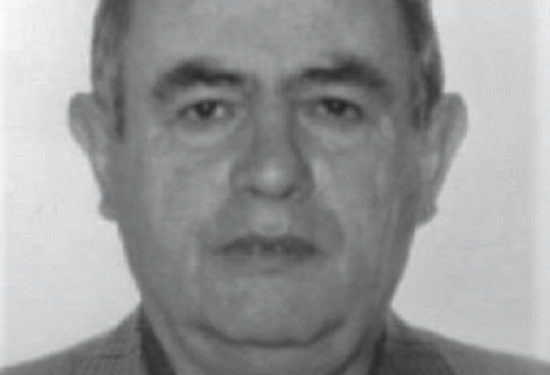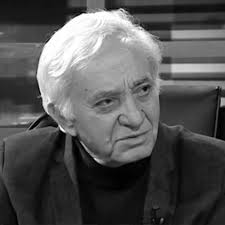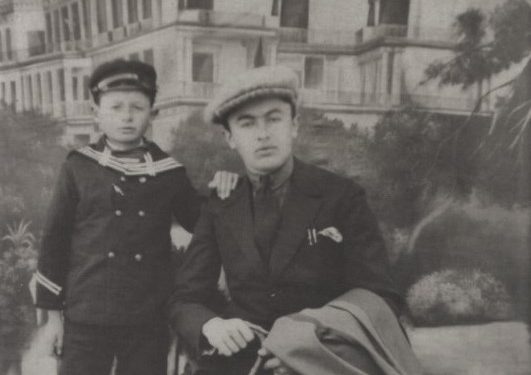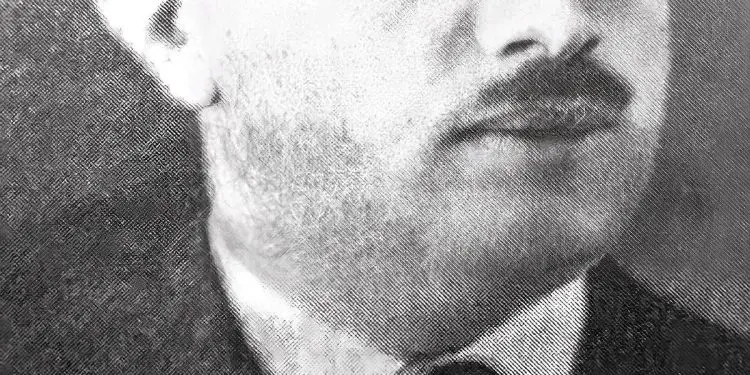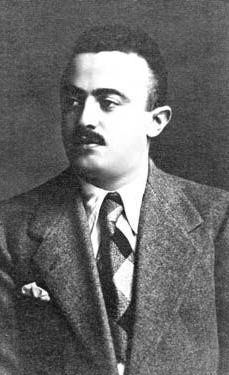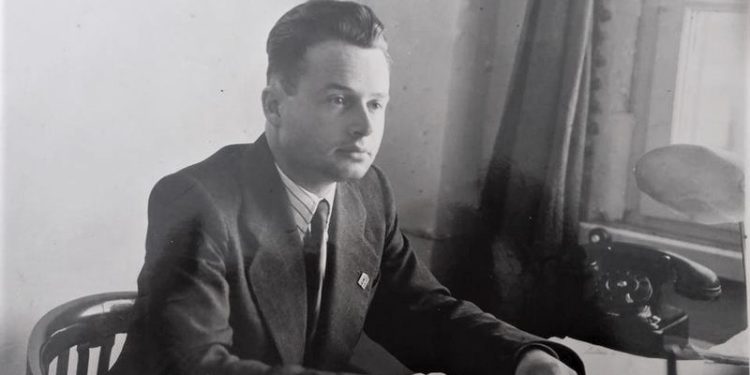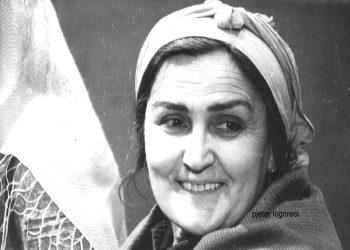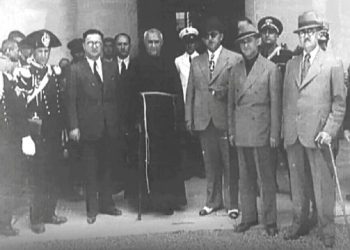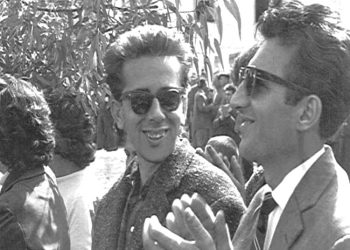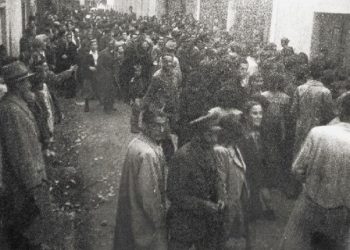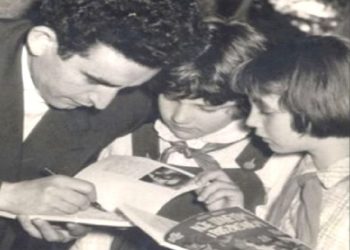By Sadik Bejko
-Portrait of an artist, Leka Toto, ‘Man and himself’, ‘Man and the state’, the last of the named Totollars –
Memorie.al / His view of today’s Albanian democracy is disappointing. Bringing that thread of thought of Albanian neo-Albanianism, the representative of which he was his father, Leka proposes an elite democracy, rather than this pluralist one that easily degenerates into anarchy. There are quick but condensed portrayals of the actors of the events, of the political class, of the parties, especially of the Albanian right. In literature, he had his preferences, yes, and he translated early on Baudelaire, the American storyteller, Sherwood Anderson, the playwright, the English essayist, the author of Dorian Gray, he translated the ‘Prison Poem’. So we were dealing with a man of elite taste. What sowed even more confusion was the deep complication of the problem in a conversation with references from philosophers such as: Santana, St. Augustine, Spencer, Hegel, Mark Aurel, Nietzsche; conversation with psychoanalytic references from Freud and Jung, with references to theology from Christ and Muhammad, Erasmus, Luther – in this eclecticism that he had not for ornament, but as an introduction to his usual assembly ode.
Time is wiser than man, let it return for good. The man? Few are like Leka. He belonged to the race of troubled souls and would remain so until the end.
Iconic
It would not be easy to make a portrait of Leka Toto, without knowing him personally, but especially without knowing his creativity. From the first meeting, you knew he was different. Beyond that stature of a man who seemed at once to have strained his physical powers, and was a heavy, tall, slightly overweight body, there was something beyond the somewhat swarthy features typical of a Southern man. of Albania, beyond those black, round, big eyes, which knew how to be sharply sad, but sad in their sweetness – and with occasional infantile farts in the fragility of chewed suffering – there was a forehead and a frown, then a bending almost to the point of bending the body from the vrik, could interrupt everything, and the place of sweetness was taken by the penetration of those eyes that were far away under the eyebrows, then his full lips took on that irony that made ice – in short, this was a difficult man, but you loved him, complicated, but you didn’t know if he was with you or with himself, and this calmed you down, but left you confused that with a skepticism in between he did so impossible to carry on another conversation times.
Maybe this happened to us who had just met him. More than that, you took with you the holes that fell on his forehead so hopelessly. Without him, it seemed that he was retreating somewhere behind himself, which told him let’s move, let’s walk… but we have nothing to do.
Something in him was irreparably killed, and with a new acquaintance like me, it made communication difficult: perhaps a fatality deeper than the times we live in, deeper even than a personal destiny that had left him unfulfilled, more beyond the shadow of death that had fallen with the scythe on his entire family tree, to a trauma that he saw in national history, and to a high meaning that he had for human life in its universal historical turmoil, but always with failures, surprises and abysses.
Leka was really a difficult man. But not being aggressive, moreover very kind-hearted, he seemed to suffer things more deeply than it seemed, and made you respect him. Maybe a whole generation killed with doubts, poisoned with mistrust.
Meditation: wisdom and bitterness
In his last two collections, there is a separate chapter: Meditations. This tendency was also noticed in the meetings with him. When he was on his own, he ran away.
What sowed even more confusion was the deep complication of the problem in a conversation with references from philosophers such as: Santana, St. Augustine, Spencer, Hegel, Mark Aurel, Nietzsche; conversation with psychoanalytic references from Freud and Jung, with references to theology from Christ and Muhammad, Erasmus, Luther – in this eclecticism that he had not for ornament, but as an introduction to his usual assembly ode. Who was this man? A persecuted of Albanian communist prisons, or a lover of philosophers and even a passionate connoisseur of them? If we jump into the world of politics, he would have his preferences from Atatürk to the ancient statesmen of Rome and to Benjamin Franklin, to the history of the French revolution, etc…!
In literature, he had his preferences, and he translated Baudelaire, the American storyteller Sherwood Anderson, the playwright, the English essayist, the author of Dorian Gray and translated the Prison Poem. So we were dealing with a man of elite taste. Misfortunes, let’s not say a tragic persecution of family ghosts, had put before him the question: why does man live and had turned him inward from introspection, to such a mania that, as he himself says, “my sick mind did not enjoy searching” and searching for a meaning of every detail, of every change in human life.
And the search would be threefold: he would turn to God emotionally and mysteriously for the mystical side, he was not a religious practitioner, but with his heart; he would turn to the signs to clarify them in their transcendence from the warnings of dreams, images, sounds, to refract these to the values of his rich knowledge from Freud and Jung; then also of philosophers. This man did not shy away from murders to solve that dark background of events in human life; he would even turn this investigation into man and himself into mania.
A truly arduous work, if not inexhaustible, in the capacity of one man, who will make the psychoanalyst, the mystic, the philosopher and the sociologist at the same time. But in the long tortures that followed him from the cradle, and that would never end, in the suicidal dilemma that had become constant in the family, with these kinds of torturous interests and torments, he managed to sublimate the evil, the murderous dilemmas , turning them into metaphysical and intellectual exercises that, if nothing else, gave him the opportunity to keep under control the demons that every man gives birth to himself, even more so in the circumstances of a life like his and his generation’s his. But also of his family.
His main theme: Man and himself, man and the state…!
In this sense, the little familiarity with him brought me, within a sympathy and attraction towards that man who imposed himself, for this different, his different kind, but more here the familiarity with his books brought me, such as: “Self-crucifixion ‘, (three plays), ‘Good Friday’ and ‘I’m reading myself’. Art, as he tells us in the essay ‘Art’ as unconscious therapy, apart from improving the mental health of a people, it primarily heals the author himself. So what I have said so far comes more from reading his literature than from my direct acquaintance with him.
How could someone so elaborate really go to waste? What he has written makes you think that we are in front of a man who could do more. It was a lack of a strong will, self-doubt…! But he says it somewhere: to create an identity, you need not isolation, but openness.
This man had to live under the poison of isolation, and like that silkworm, under the bright cocoon, he has no place but to turn and spin in the endless corners of himself and the cocoon-prison. Unfortunately, difficult circumstances know how to kill elite souls more seriously than those who act with the vulgar will, without going anywhere, they don’t even think about it. Leka belonged to those who do not chew everything. His tastes were sharpened by study and suffering. Hopes were killed from the cradle.
To dwell more concretely on his works, it is not difficult, but what can be important for those who want to delve into the study of man and society, these are the writings of a man who is feeling that the end is near. There are two or three obsessive themes that repeat and repeat. Warning signs, such as: “He sees Ganiu, the dreams, the repeated melody that takes him from the shadows of adolescence and childhood, when the fog-fog first reveals eros, a young girl in suicide and fatality, always with a physical ugliness, somewhere a burnt face, where a deaf mute, where another girl abandoned by her father, men abandoned in solitude and in their last days, and the recollection of his and his tribe’s misfortunes”.
Here it remains to be investigated: why would you call these visions hygomatic? Be it that ’97 made the old wounds of the suffering people ache again that in a very shocking sadness people like him came back and were bitterly chewing over their suffering under this disappointment. It can also be an endless and heavy curse for the perpetrators, whoever they may be, who forced some very suffering people to come back and chew on their wounds again. Curse, that perhaps with this cup of poison on their lips, they hastened their escape from this life.
A topic could be the fatality of a family and a nation, what is being discussed and it could be a big topic, but, as I said, it only comes up from time to time, it is the topic of the participation of the individual in politics in affairs of the state and which is accompanied by misfortune, if not the crushing and misery of the individual and of the whole family. And for this, the Toto family is a prime example, including Leka himself, who somehow avoided the leveling mortar that, like a heavy machete, cut into the flesh of this trunk.
Just to mention, his uncle, Et’hem Toto, from the former minister of King Zog, in 1936, jumps into an armed rebellion against him; fails and kills himself. Bernard Fisher says this was a drama of betrayed faith. Et’hem Toto, was honest and loyal to the Monarch, but you are not always rewarded as such. On the contrary. His 29-year-old brother, Ismet Toto, a well-known essayist and thinker in the midst of neo-Albanianism, when he found out what happened to his brother, got off the ship and surrendered with the words: “We have to tell the people why we stood up”.
It hangs on a rope. Their brother Selaudin Toto, physicist, pupil of the Italian atomist, Eriko Fermi, was executed with the “Group of Deputies” in 1947. These events in the family were followed by the suicide of an uncle of the Toto brothers, and three women of different ages. In Albania, whoever got involved in politics has had their fair share of misfortune. Yes, maybe the Totollars were not printed with politics at all.
Trend from an elite style
His work, including the three plays that he published since 1993, consists of three books, the first, with the plays we mentioned, the second, ‘Shen e Premtja’, (published by Albin, 1996) contains only the drama , prose and meditations, the third, ‘I am reading myself’ (published by Globus R, 2000) contains stories, essays and nonfiction. If the tragic colors all his texts, we must say that they, apart from the ideas, stand out for the style. Leka Toto expressed in the essay that we mentioned, Art as therapy of the unconscious, that the ancient image, which came to the unconscious of the artist, brings order to the health of the people sick of deviance, a consequence of its real social and political times.
You would say that both his prose and drama would shine through the images. But the opposite happens. His style resembles that of an aged gentleman, and of a very different formation, from those writing around him in time. His style is distinguished by the tendency to compression, meditation, by a dense and aphoristic writing, where judgment quickly replaces rationed description.
He has this tendency to philosophize and problematize events and facts as a creative process in his plays, which are more like philosophical dialogues, the confrontation of ideas, than the creation of situation and character. His dramas, inspired by the reality of pain, its acceptance under an almost religious resignation, where it proceeds in the manner of Plato’s dialogues, confront us with people under the weight of suicidal sins, which come as a result of the circumstances, but also of the tragic guilt of these very characters who could not resist their own temptations.
Here Leka differs from many others in his class who see the problem in terms of: us and time, not: us and ourselves. Even within this strict style, we could stop at three pieces of prose that speak of achievements that could very well stand next to the most accomplished pages of Albanian prose as a whole. Such is the novel “I am reading myself”.
With that contained tragic tone, with the strength of details and situations, with the breaks of the subject, with the brevity and poetry of the narrative, with the propositional alternation of description and judgment, she puts us in front of a work that came after a long and well weighted, in a really refined and very fine style.
Yes, the story autumn is like that, I would say unparalleled in terms of the variety of details, situations and for that tension that keeps the breath suspended with the introspective psychoanalytic deductions, with that feeling of anxiety that fills it to the brim and with the warning signs. Of a plan and of a different technique is the story “Stone”, which leads to the highlands of the first years after the Second World War and which has a psychological weight of the young intellectual, before a human catastrophe.
Here are drawn general pictures intertwined with the fate of individuals given these with the diary technique. Even in the long story ‘The Journey’, we get a lot of biographical information about the author and his class, although it falls short of the three stories we noted above.
Continuing with his themes, in these proses the fate of the persecuted class in Toto’s pen is saved from two or three of the diseases that have the proses of his brothers: pathos, the river of facts and journalistic character. Leka, beats by mysticism and the search to find a meaning beyond the facts.
Publicist with a taste for essays
His journalism and essays, his meditations would need a special attitude, to better investigate the sources of such production and the schools and authors read and liked by him. The disappointment of the 1997 mess led Leka Toto to some journalistic writings in which, in a meditative style, he expresses a desire to make wider and continuous syntheses, under a gaze that climbs to see above and beyond the events, referred to his political experience and that of his family, as well as meditations and long readings in this field.
His view of today’s Albanian democracy is disappointing. Bringing that thread of thought of Albanian neo-Albanianism, the representative of which he was his father, Leka proposes an elite democracy, rather than this pluralist one that easily degenerates into anarchy. There are quick but condensed portrayals of the actors of the events, of the political class, of the parties, especially of the Albanian right.
The Albanian society, in the totality of all its territories and events, with its rolling and rambunctious ups and downs, yes and in the dream that most breathes in the bosom of people for a hope and the need to hold on in hope, in these years it happens in that apocalyptic upheaval when, out of chaos, the cosmos is created, this and with the events of Kosovo that the author refers to.
His texts, like all of us, witnesses who see the events from so close, without that sobering distance, have the value of a man who, even in the last days of his life, is shocked by something big that is happening around us, is cracked lips at our fate of being small and poor, in a jungle world and totally unstabilized, moreover in the state of severe traumas, which can breed and other more frightening ones.
Time is wiser than man, let it return for good. The man? Few are like Leka. He belonged to the race of troubled souls and would remain so until the end. He died in 2001, on June 1 this year he would have been 89 years old. Memorie.al




